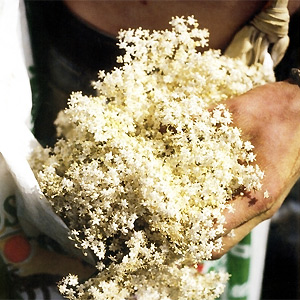It's time to make elderflower champagne...
Say cheers to fruity, frothy fizz - for free!
 Say cheers to fruity, frothy fizz - for free!
Say cheers to fruity, frothy fizz - for free!
I know we shouldn't call it 'champagne', but I really don't think the champagne houses of Reims and Epernay need be too worried about a threat to their empire. (I've just visited a champagne house in Reims - it was fascinating; I highly recommend it if you're in the area.)
Elderflower 'champagne' is an alcoholic fizzy drink made from elderflowers. Natural yeasts supply the bacteria to feed on the sugar and turn it into alcohol. If you like the taste of elderflower cordial, you'll love elderflower champagne. And I find it even more delicious because it's free, except if you need a new bucket (the one I made last year's elderflower fizz in seems to have disappeared so I bought a new one at the weekend).
How to make elderflower champagne: pick five or six elderflower heads, preferably on a sunny day. They grow everywhere, in the city as well as the country. Once you're looking out for them, you'll see them everywhere and start daydreaming about going into production from the groves of elders by the motorway, on derelict land... or is that just me? Choose elder trees that aren't on a busy road, and avoid flowers lower down that may be contaminated by the urine of dogs, foxes, or even humans... Pick off any insects etc before using. Don't run the flowers under the tap or you'll wash the natural yeasts off.
Worried that you won't recognise an elder tree? Take a look at these Google images of elder trees and elderflowers.
To make: pour 20 litres of cold water into a plastic bucket of at least 25 litres capacity. Stir in 1kg of ordinary sugar until dissolved. Drop in the flower heads and stir to submerge. Add the zest and juice of two lemons and 4tbsp white wine vinegar. Stir to mix, then lay a clean teatowel over the bucket and leave for 24 hrs, stirring occasionally.
After 24 hours, pour the liquid through a sieve to remove the detritus, then pour though a funnel into a collection of two-litre plastic bottles. (If you don't have enough in your recycling, you can buy two litres of mineral water for under 20p at supermarkets.)
Leave the bottles for at least two weeks. They'll become more rigid as the fermenting causes carbon dioxide to build up, and you can unscrew the top a little (carefully!) to release some of the pressure. After two weeks you can drink it, and it'll be around 3% alcohol, depending on how your fermentation went. It slips down very easily, and is particularly delicious with gin - probably best not to drive to be on the safe side...
I'm off out picking the elderflowers tonight...
Apparently, elderflowers have health benefits: very good for dark circles - could be just the thing for the morning after...
Want to make something else with the elderflowers? How about elderflower cordial, or elderflower fritters?
Post your comment
About This Blog
About The Authors

Carla Griscti
Editorial assistant on allaboutyou; Music lover, travel bee and food fanatic.
Read more
Emma Marsden
Food consultant of All About You, loves creating something out of nothing and decluttering.
Read more
Bernadette Fallon
Editor of All About You; an online journalist with a fetish for glossy magazines.
Read more
Carol Muskoron
Associate editor of All About You, loves life (mostly) and one-pan recipes (always).
Read more- Most recent
- Most popular
- Things I'll be cooking in January...
- Pass on the joy of Parmesan parsnips this Christmas!
- Bring back the OXO Christmas advert!
- Lynda Bellingham RIP: three of the best OXO adverts
- Indian crab patties and more unusual spicy treats!
- 'The Great British Bake Off': final review
- 'The Great British Bake Off': week nine review
- 'The Great British Bake Off': week eight review
- 'The Great British Bake Off': week seven review
- Wine tasting at Vinopolis, London
- Doing it by Mrs Beeton's book
- The five best things I ate this week
- Sherry and Spanish tapas in London
- The five best things I ate this week
- Sex guaranteed or your money back on a fish pie!
- Easy ginger cake recipe
- Carla's recipe of the week: saucy beans and eggs
- The five best things I ate this week
- Christmas dinner menus 3
- Lynda Bellingham RIP: three of the best OXO adverts
Archive
- January 2015
- December 2014
- October 2014
- September 2014
- August 2014
- July 2014
- May 2014
- April 2014
- February 2014
- January 2014
- December 2013
- November 2013
- October 2013
- September 2013
- August 2013
- July 2013
- June 2013
- May 2013
- April 2013
- March 2013
- February 2013
- January 2013
- December 2012
- November 2012
- October 2012
- September 2012
- August 2012
- July 2012
- June 2012
- May 2012
- April 2012
- March 2012
- February 2012
- January 2012
- December 2011
- November 2011
- October 2011
- September 2011
- May 2011
- April 2011
- March 2011
- February 2011
- January 2011



